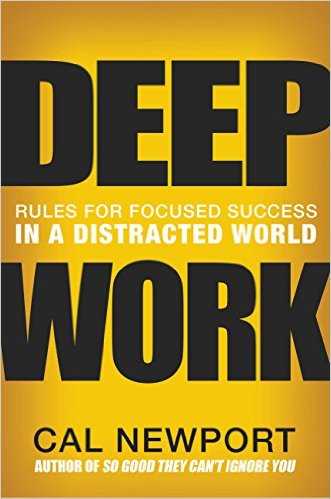The Philosophies of Deep Work
In his book “Deep Work“, Cal Newport formulates a few different ways we can engage in deep work.
But first, what is “Deep Work”?
Deep Work: Professional activities performed in a state of distraction-free concentration that push your cognitive capabilities to their limit. These efforts create new value, improve your skill, and are hard to replicate.
Our creative work also falls under this “Deep Work”
So how do you develop a deep work habit?
The key to developing a deep work habit is to move beyond good intentions and add routines and rituals to your working life designed to minimize the amount of your limited willpower necessary to transition into and maintain a state of unbroken concentration
Among other things, they’ll ask you to commit to a particular pattern for scheduling this work and develop rituals to sharpen your concentration before starting each session
You must be careful to choose a philosophy that fits your specific circumstances, as a mismatch here can derail your deep work habit before it has a chance to solidify
What are these philosophies of deep work then?
- Monastic Philosophy
This philosophy attempts to maximize deep efforts by eliminating or radically minimizing shallow obligations. Practitioners of the monastic philosophy tend to have a well-defined and highly valued professional goal that they’re pursuing, and the bulk of their professional success comes from doing this one thing exceptionally well. It’s this clarity that helps them eliminate the thicket of shallow concerns that tend to trip up those whose value proposition in the working world is more varied.
- Bimodal PhilosophyIn this philosophy, you have some clearly defined stretches of time dedicated to deep work. The rest is open to everything else.
During the deep time, the bimodal worker will act monastically—seeking intense and uninterrupted concentration. During the shallow time, such focus is not prioritized.
During the deep time, the bimodal worker will act monastically—seeking intense and uninterrupted concentration. During the shallow time, such focus is not prioritized.
So the minimum unti of time for deep work for the bimodal philosophy is one work day.
Those who deploy the bimodal philosophy of deep work admire the productivity of the monastics but also respect the value they receive from the shallow behaviors in their working lives.
- Rhythmic Philosophy
This philosophy argues that the easiest way to consistently start deep work sessions is to transform them into a simple regular habit. The goal, in other words, is to generate a rhythm for this work
… that removes the need for you to invest energy in deciding if and when you’re going to go deep.
Another common way to implement the rhythmic philosophy is to replace the visual aid of the chain method with a set starting time that you use every day for deep work.
- Journalist Philosopy
…you fit deep work wherever you can into your schedule
Isaacson was methodic: Any time he could find some free time, he would switch into a deep work mode and hammer away at his book.
– about Walter Isaacson.
This approach is not for the deep work novice.
So, what is your preferred approach?
I would love to be monastic – but at this stage in life, that is not an option available to me. I have tried the rhythmic approach – but I work best, naturally, in the bimodal approach – once I start working on something, I tend to work on that the whole day.
February 09, 2017
